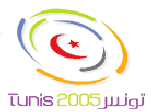SHORT REPORT ( by Francis Muguet )
The fight mostly concerned the paragraph below.
The Brasilian delegation asked me to come to the
ad hoc working group that is formed when several states
cannot reach a consensus during the plenary.
I was the only Civil Society observer.
There was no representative from the Business sector or from CCBI.
Some delegates told me, that a lobbyist a software monopol was
part of a governemental delegation, which would constitutes a novelty
in reference to phase I. I was not able to verify this assertion.
I was kindly allowed to speak by the Chairman from
Barbados just after a recess and allowed to stay.
Concerning ;
http://www.itu.int/wsis/docs2/pc2/off11ann1rev1.html
37. We recommend improvements and innovations in existing financing
mechanisms, including:
a. Improving financial mechanisms to make financial resources become
adequate, more predictable, preferably untied, and sustainable;
b. Enhancing regional cooperation and creating multi-stakeholder
partnerships, especially by creating incentives for building regional
backbone infrastructure;
c. Providing affordable access to ICTs, by the following measures:
i. Reducing international Internet costs charged by backbone providers,
supporting, inter alia, the creation and development of regional ICT
backbones and Internet Exchange Points to reduce interconnection cost
and broaden network access;
ii. Encouraging ITU to continue the study of the question of the
International Internet Connectivity (IIC) as an urgent matter to develop
appropriate Recommendations;
---> Option 1: Proposed by Brazil, Cuba, India and Holy See: Promoting
awareness of the positive externalities generated by the development and
use of free and open source software].
[Option 2: Promoting awareness of possibilities generated by different
software models including proprietary, free and open source software.]
[Option 3: Promoting the development and use of open source and
proprietary software with low total cost of ownership and effective
interoperability, while improving awareness of all available options.]
[Option 4: Promoting awareness of the possibilities generated by
different software models and the competitive impact that free and open
software has had on proprietary software systems that has resulted in a
wide range of a cost effective solutions for consumers].
Interestingly, you may notice that the Holy See is supporting Free
Software. After all the Free Software philosophy is in perfect
agreement with Christian values.
Hope this is not going to change with the new pope !.
I underlined the need also to allow free interoperability.
My exact language suggestion was to add to the option proposed
by Brazil "within a freely interoperable environment".
As you are well aware, Software patents + disclosure of protocols
( so called "interoperability" at "an affordable licensing cost" )
is the new strategy by monopols to prevent reverse engineering,
and therefore replacement of proprietary software by free ones,
and to prevent free software to read/write proprietary formats and
file systems.
Canada as well as the chair from Barbados, (a kind person
with a good technological expertise ) supported the interoperability
issue. Brazil did not catch at first its importance but latter
on realized it.
Russia was of the opinion that Interoperability desserved a paragraph
of its own.
Here is the current state of affair concerning this paragraph
over which no consensus could be reached and it will be
discussed again during PrepCom3.
Working Group Meetings
16.02.05 Wed 12:00-13:00 Room XXIII WG meeting
21.02.05 Monday 10:00-11:00 Room XXIII WG meeting
22.02.02 Tuesday 10:00-11:00 Room XXIII WG meeting
24.02.05 Thursday 10:00-11:00 Room XXIII WG meeting
25.02.05 Friday 10:00-11:00 Room XXIII WG meeting

